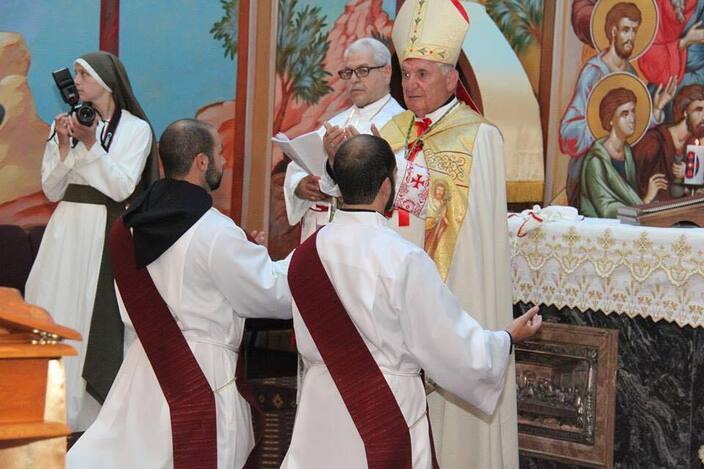St. Michael’s Chaldean Catholic Church
Holy Orders

There are three degrees of high clerics in the church which are conferred through the sacrament of Holy Orders: deacon, priest and bishop. The fullness of the sacrament is given to the bishop, whereas the priest is ordained to serve the ministerial role in the church through the administration of the sacraments with his bishop, and the deacon is ordained to serve according to the diaconal capacity. The sacrament can be administered only by a bishop.
Our Lord instituted this sacrament in the Last Supper, the first Mass, when he celebrated the first Eucharist with his apostles and commanded them to “do this” in memory of him, thereby giving them the power to follow his command, ordaining them priests. Thus, the highest dignity of the priest and his service is tied intimately with the Eucharist and the altar of the church. The priest is ordained to confer the sacraments in persona Christi, in the very person of Christ. It is for this reason, among others, that in the ordination rite of the Chaldean Church, a hymn is sung which states: “Great is Gabriel, and glorious is Michael, as their names attest; but they are as nothing compared to the dignity of the priesthood.”
The sacrament of Holy Orders is a sacred and foundational rite within the Catholic Church, conferring a special grace and authority upon those called to serve as ordained ministers. Rooted in apostolic tradition and the teachings of Christ, Holy Orders bestows the gift of leadership, pastoral care, and sacramental administration upon those who dedicate their lives to the service of God and the Church.
Sacred Ordination and Ministry:
Holy Orders encompasses the ordination of deacons, priests, and bishops, each with distinct roles and responsibilities. Deacons assist in the liturgy, proclaim the Gospel, and engage in acts of charity. Priests preside over the Eucharist, offer pastoral care, and administer sacraments. Bishops are entrusted with overseeing dioceses and perpetuating apostolic succession.
Continuation of Apostolic Authority:
Holy Orders maintains the unbroken chain of apostolic authority, dating back to the original apostles chosen by Christ. Bishops, as successors of the apostles, ensure the continuation of Christ’s teachings, preserving the Church’s unity, sacraments, and doctrinal integrity.
Service and Sacrifice:
Those ordained through Holy Orders commit themselves to lives of service and sacrifice. By offering spiritual guidance, administering sacraments, and shepherding the faithful, ordained ministers exemplify Christ’s selfless love and dedication to His people.
Celebration of the Eucharist:
The sacrament of Holy Orders enables priests to preside over the celebration of the Eucharist, the central act of Catholic worship. Through their consecration, priests bring about the transformation of bread and wine into the Body and Blood of Christ, nourishing the spiritual lives of the faithful.
Vocations to Leadership:
Holy Orders recognizes the unique vocational call of individuals to leadership roles within the Church. Those who feel called to this sacrament undergo a discernment process, culminating in ordination, which equips them to carry out their ministry with humility, wisdom, and dedication.
Community and Service-Centered Ministry:
Ordained ministers play a vital role in building and nurturing the faith community. Through their pastoral care, teaching, and guidance, they offer spiritual direction and support to believers, fostering a sense of unity and growth within the Church.
Conclusion:
The sacrament of Holy Orders holds a crucial place within the Catholic Church, embodying the continuation of apostolic tradition and the authority to lead and serve. Ordained ministers, whether deacons, priests, or bishops, undertake a sacred calling that embodies Christ’s example of service, sacrifice, and love. Through Holy Orders, the Church ensures the perpetuation of its mission, the administration of sacraments, and the provision of spiritual guidance, nurturing the faith and unity of believers for generations to come.
